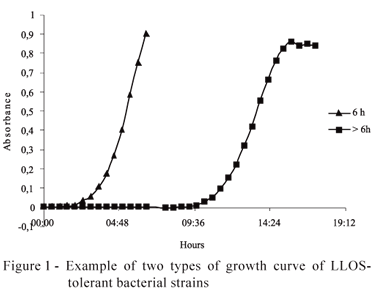It was aimed in this work to evaluate bacterial strains tolerant to products based on propolis (LLOS) through the isolation, morphological and biochemical characterization techniques in diets with roughage:concentrate ratio 100:0 and 50:50. For roughage diets, the products LLOSC1 and LLOSB3 were evaluated, and for 50:50% diets, the products LLOSC1, LLOSD1, LLOSA2, and LLOSC3, which differed in alcoholic concentrations (1, 2 and 3) and propolis (A, B, C and D) concentrations. The ruminal liquid was anaerobically incubated at 39°C for 6 days in medium containing LLOS. After isolation, the strains were submitted to Gram staining and the bacterial growth was monitored by photospectrometer. It was evaluated the strain growth in the presence of the following subtracts: arabinose, cellulose, glucose, cellobiose, xylose, fructose, and lactose. In roughage diets, strains tolerant to LLOSC1 and LLOSB3 were similar to carbohydrates degradation, except lactose in which LLOSC1 was superior to strains tolerant to LLOSB3. For diets with 50:50 roughage:concentrate ratio, the products LLOSC3 and LLOSA2 stood out because they selected the highest number of strains able to degrade most of the tested carbohydrates. The results suggest that tolerance to propolis is higher in Gram-positive strains with several growth metabolic levels.
additives; bacterial strains; carbohydrates; rumen fermentation




